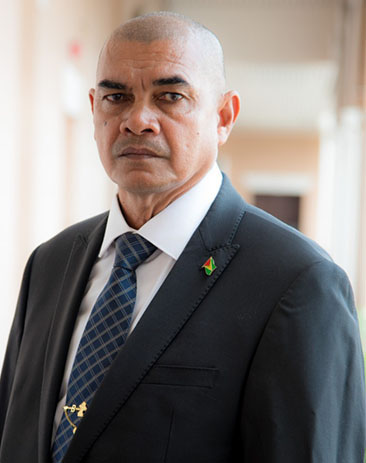Winston Jordan and Raphael Trotman, the ministers of Finance and Natural Resources respectively, say that they have filed their declarations to the Integrity Commission as required under the Integrity Commission Act, but Minister of Business Haimraj Rajkumar is yet to do so.
The Act requires all public officers, which includes ministers, to file declarations of their assets, as well as those held by their spouses and children, by June 30th of every year. Chairman of the Integrity Commission Kumar Doraisami told Stabroek News earlier this month, however, that the deadline had been extended to August 31st, but by that date, many persons still had not filed their declarations.
Stabroek News reported last week that up to September 20th, senior government ministers Khemraj Ramjattan and Cathy Hughes were yet to file their declarations though Hughes indicated that she was planning to do so later that day. It is not clear if Ramjattan has since filed his declaration. Director General of the Ministry of the Presidency, Joseph Harmon, had also indicated that he has filed his declaration for the year ending June 30th.
Rajkumar told Stabroek News last week that he is yet to file his declarations because he has applied for a bank statement, but had not yet received it. Like Minister of Public Infrastructure David Patterson, Rajkumar believes the fact that the financial year of the commission does not accord with the financial year of financial institutions and other entities on which he relies for the documentation he is required to submit, creates a problem which results in delinquency.
“That is why it is a problem. Sometimes the bank does not give you your statement at the end of June. In fact, I have not gotten mine as yet. I am still waiting on the bank,” Rajkumar said.
Doraisami has also said that he believes the entity’s financial year should be changed to coincide with that of the Ministry of Finance, as this difference has led to difficulties in the body accessing funds to finance some of its operations.
Meanwhile, Trotman and Jordan have filed their declarations. Jordan said that he filed his declaration well before this year’s deadline. Trotman, meantime, divulged that last year, the commission asked him to send copies of documents to support declarations he filed. He said that he found the request for additional information was in order, because “if you say you own something, show me what you own.
“I am the one who should have anticipated that and sent everything at once,” he said.
Meantime, while Trotman and Jordan both support making the commission an independent entity, and availing it financial independence, Jordan said that financial independence must always be circumscribed by available resources. The ministers shared this information, and these positions, with Stabroek News during separate interviews last week.
Doraisami had previously said that financial constraints have affected the commission’s ability to investigate declarations filed, and prosecute delinquent public officers. He had revealed that he has unsuccessfully approached the Finance Ministry for additional funding to allow the agency to properly execute its mandate. He was told, Doraisami said, that additional funds will not be available until next year.
With general and regional elections slated to take place March 2, 2020, and in light of Jordan’s disclosure that no budget will be prepared in light of government’s caretaker status, additional funds may not be forthcoming early next year.
In light of these realities and the nature of the commission, Trotman said that he supports making the entity financially independent. “I think it is a step in the right direction if it is given a block vote. It reinforces not just government’s but the state’s commitment to transparency and accountability,” he said.
Jordan, for his part, said that he supports financial independence and elevating the commission to constitutional status, the caveat being that financial independence must still be circumscribed.
“Financial independence must be circumscribed by resource availability because, very often, people want ten times what I can afford to give them based on the revenues I can collect and what I can borrow…but insofar as you have to depend on the treasury for resources with a government which is running a deficit…your financial independence will be circumscribed,” Jordan explained.
He added that even if the entity is financially independent, when it submits a budget to the National Assembly, his ministry will also submit a budget, and invariably, his ministry’s budget is preferred, as it is informed by the commission’s needs, as well as available resources.
Jordan said that once the agency receives its funds though, it has full independence on how it spends those funds.










